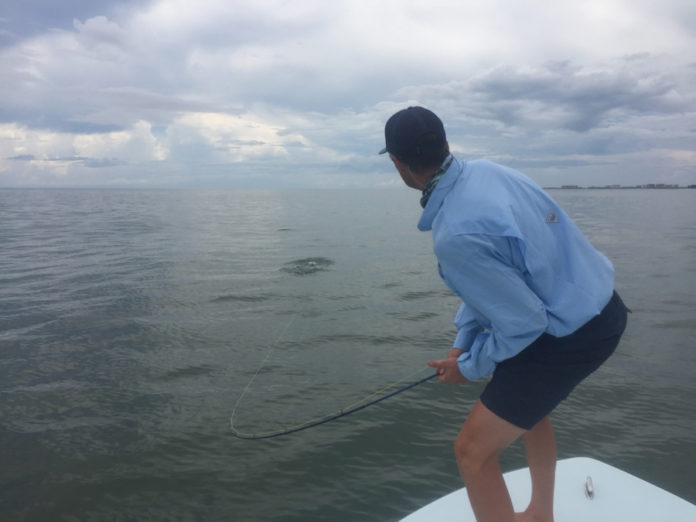Written by: Evan Jones
All photos by Evan Jones
Fighting a big redfish on fly is quite a bit different than fighting a big trout. Not only is your equipment significantly upsized, but so are the fish and their environments, factors which combine to demand different techniques when doing battle with reds. Anglers who are able to make these adjustments will not only land fish more consistently, but do so in less time, benefitting both fish and fisher alike. Here are three tips for fighting redfish, or any similarly-size saltwater gamefish:
1. Pull HARD

If you are used to catching trout on relatively small hooks and light tippet (as most fly anglers probably are), then this point really can’t be over-stated. When it comes to pulling against a redfish, you don’t usually have to worry about the 1/0 hook popping out, nor about snapping the 15 pound(ish) tippet. So long as you don’t increase pressure too suddenly, you’re at liberty to pull as hard as you can, and that’s exactly what you should do. Think of fighting redfish as a brutal tug-of-war, not like the delicate dance of landing a trout on 6X.
2. Keep the Rod Tip Low

Keeping the rod tip below your waist during the fight will increase your leverage by allowing the rod butt to bend fully, applying maximum force to your line. Again, this may initially be counter-intuitive for some trout anglers, who are used to keeping the rod tip high in order to protect light tippet. Fighting a redfish like that will often get you bossed around the flat, or worse yet, pull the hook and force you to settle for a long-distance release. Lowering the rod and using more sideways pressure to flex it will produce the most efficient results, not only pulling the fish in faster but saving you some energy in the process.
3. Steer the Head

Reds are very strong and very stubborn, so it’s likely going to be a protracted battle even against smaller fish. And while the fight will often take place on open flats with few obstacles, there are still occasional hazards to avoid like dock pilings, crab traps, oyster bars, and the like. When you can’t stop a fish from running, try holding the line tighter and pulling at a quartering angle away from its direction of travel. When the line stops going out, it’ll force the fish to travel in a semi-circle rather than continuing straight ahead, but won’t put enough pressure on the terminal tackle to dislodge it. You can use this technique to limit their options even as they’re running away, although it does take some practice to fine-tune. Try to avoid pulling the line when the fish is facing directly toward you, as that can sometimes dislodge the hook. Instead, stomp your feet to discourage the fish from continuing in your direction, and then continue to apply sideways pressure opposite to whichever direction the fish turns.
Evan Jones is the assistant editor of the Orvis Fly Fishing blog. He lives in Colorado.
Credit: Source link




























